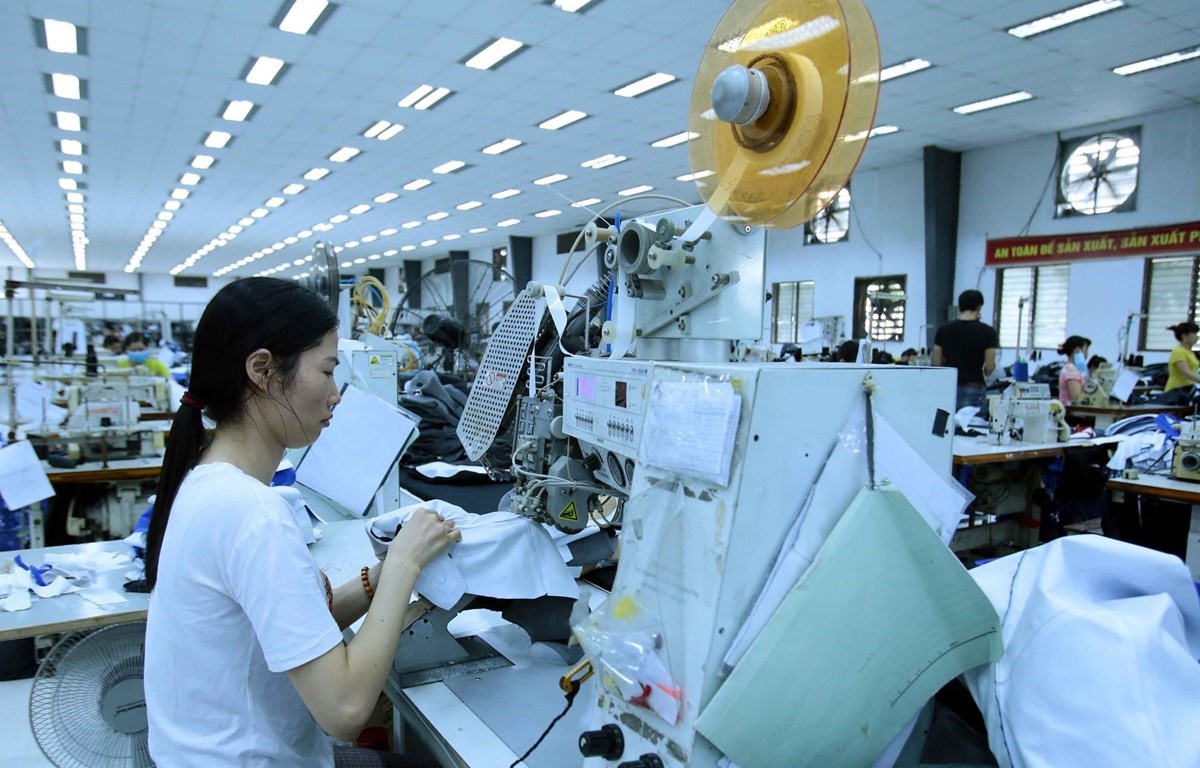Strong reforms needed to accelerate transition of market economy: CIEM
The 13th National Party Congress set a target that Vietnam will establish itself as a developing country with modern industry and upper-middle income by 2030, and a developed, high-income country by 2045.

Illustrative image (Source: VNA)
Hanoi (VNA) - The 13th National Party Congress set a target that Vietnam will establish itself as a developing country with modern industry and upper-middle income by 2030, and a developed, high-income country by 2045.
To that end, it needs to make strong, intensive, and extensive reforms to substantively transform into a fuller market economy with social and environmental responsibility.
A group of experts at the Central Institute for Economic Management (CIEM) made the suggestion at a workshop held in Hanoi on March 28 to announce the results of a study on perfecting the market economy in Vietnam.
The study was conducted by the Central Institute for Economic Management as part of the Macro-economic Reforms/Green Growth Programme in Vietnam implemented by the German Agency for International Cooperation (GIZ).
Slow transition of the economy
According to the study, Vietnam has obtained many significant outcomes in developing a market-oriented economy over the past 35 years.
Director of the Central Institute for Economic Management Tran Thi Hong Minh said from a centralised, bureaucratic, and subsidised economy, a market economy has developed in Vietnam. Reforming the mindset and awareness of the market economy is an important milestone creating the foundation for building and completing the market economy in the country.
The role and functions of the State, along with relations among the State, the market, and society are better aligned with the market mechanism. Fundamental factors for the market mechanism’s operations have taken shape and become clearer, she said. Market opening and international integration are critical catalysts for the country to press on with developing and perfecting its market economy in the recent past.
The study found that working towards a market-oriented economy over the past 35 years, Vietnam has seen a leaner, and more efficient and effective State apparatus, an improved business climate, and an economy with increased size and quality. From a poor and underdeveloped country, it has become a developing country with lower-middle income since 2008.
However, the study also pointed out many shortcomings and challenges during that process.
Nguyen Thi Luyen, Deputy Head of the Board for Enterprise Reform and Development Studies under the Central Institute for Economic Management, cited the study as saying that it was necessary to continue reforming the mindset. It is also necessary to clarify the relationship between the market economy development and the socialist orientation, ensure equal and orderly competition, and guarantee social, environmental, and ecological issues.
Clearing up the State’s interference
Dau Anh Tuan, Director of the Department of Legal Affairs at the Vietnam Chamber of Commerce and Industry (VCCI), stressed that it was necessary to clear up the State’s interference into the market.
Many ministries and sectors have issued circulars with the aim of managing the market, but this was a mistake as management was just a means not the target. Furthermore, the management means has increased the cost of doing business.
According to the official, the State’s current role was not clear, while there remains interests of sectors and overlaps in management and legal documents, resulting in obstacles hindering the development of private enterprises.
Therefore, Tuan proposed a number of solutions to develop private enterprises in the coming time. Building legal frameworks to protect asset rights, intellectual property rights and contract rights will help. Also, accelerating administrative procedure reforms, stepping up the application of information technology, and strengthening the fight against corruption and renewing the method of management are other solutions to deploy.
At the workshop, participants discussed the basic reforms during the transition to a market economy, shortcomings and lessons, the main challenges to the market economy completion, and orientations for continued reforms./.
To that end, it needs to make strong, intensive, and extensive reforms to substantively transform into a fuller market economy with social and environmental responsibility.
A group of experts at the Central Institute for Economic Management (CIEM) made the suggestion at a workshop held in Hanoi on March 28 to announce the results of a study on perfecting the market economy in Vietnam.
The study was conducted by the Central Institute for Economic Management as part of the Macro-economic Reforms/Green Growth Programme in Vietnam implemented by the German Agency for International Cooperation (GIZ).
Slow transition of the economy
According to the study, Vietnam has obtained many significant outcomes in developing a market-oriented economy over the past 35 years.
Director of the Central Institute for Economic Management Tran Thi Hong Minh said from a centralised, bureaucratic, and subsidised economy, a market economy has developed in Vietnam. Reforming the mindset and awareness of the market economy is an important milestone creating the foundation for building and completing the market economy in the country.
The role and functions of the State, along with relations among the State, the market, and society are better aligned with the market mechanism. Fundamental factors for the market mechanism’s operations have taken shape and become clearer, she said. Market opening and international integration are critical catalysts for the country to press on with developing and perfecting its market economy in the recent past.
The study found that working towards a market-oriented economy over the past 35 years, Vietnam has seen a leaner, and more efficient and effective State apparatus, an improved business climate, and an economy with increased size and quality. From a poor and underdeveloped country, it has become a developing country with lower-middle income since 2008.
However, the study also pointed out many shortcomings and challenges during that process.
Nguyen Thi Luyen, Deputy Head of the Board for Enterprise Reform and Development Studies under the Central Institute for Economic Management, cited the study as saying that it was necessary to continue reforming the mindset. It is also necessary to clarify the relationship between the market economy development and the socialist orientation, ensure equal and orderly competition, and guarantee social, environmental, and ecological issues.
Clearing up the State’s interference
Dau Anh Tuan, Director of the Department of Legal Affairs at the Vietnam Chamber of Commerce and Industry (VCCI), stressed that it was necessary to clear up the State’s interference into the market.
Many ministries and sectors have issued circulars with the aim of managing the market, but this was a mistake as management was just a means not the target. Furthermore, the management means has increased the cost of doing business.
According to the official, the State’s current role was not clear, while there remains interests of sectors and overlaps in management and legal documents, resulting in obstacles hindering the development of private enterprises.
Therefore, Tuan proposed a number of solutions to develop private enterprises in the coming time. Building legal frameworks to protect asset rights, intellectual property rights and contract rights will help. Also, accelerating administrative procedure reforms, stepping up the application of information technology, and strengthening the fight against corruption and renewing the method of management are other solutions to deploy.
At the workshop, participants discussed the basic reforms during the transition to a market economy, shortcomings and lessons, the main challenges to the market economy completion, and orientations for continued reforms./.












